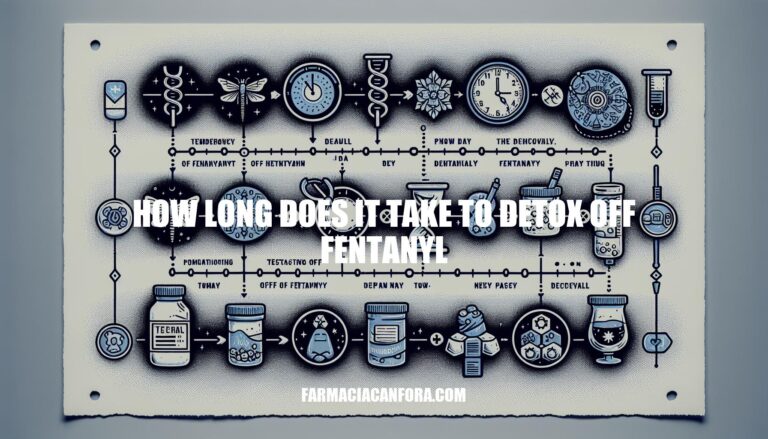


Detoxing from fentanyl, a potent synthetic opioid, is a critical step in overcoming addiction. Understanding the detox timeline is essential because it helps prepare individuals for the withdrawal process, which can be intense and challenging. Typically, withdrawal symptoms begin within 8 to 24 hours after the last dose, peak around 36 to 72 hours, and can last for about a week. Proper medical supervision during detox can significantly ease symptoms and ensure safety.
Here are some key factors that can influence the duration of fentanyl detox:
Dosage: Higher doses of fentanyl can lead to more severe withdrawal symptoms and a longer detox period.
Frequency of Use: Frequent use can cause the body to develop a higher tolerance, making the detox process longer and more challenging.
Duration of Use: Long-term use of fentanyl can result in prolonged withdrawal symptoms as the body has become more dependent on the drug.
Method of Administration: The way fentanyl is taken (e.g., orally, intravenously, or through patches) can affect how quickly it is metabolized and eliminated from the body.
Individual Health Conditions: Factors such as liver and kidney function, metabolic rate, and overall physical and mental health can significantly impact the detox timeline.
Use of Other Substances: Concurrent use of other drugs or alcohol can complicate the detox process and extend the duration of withdrawal symptoms.
Type of Fentanyl: Whether the fentanyl is extended-release or immediate-release can also influence the detox duration.
Here’s a general timeline for detoxing off fentanyl:
Withdrawal symptoms can include muscle and bone pain, insomnia, diarrhea, vomiting, and severe cravings.
During fentanyl detox, symptoms typically start within 8-24 hours after the last dose. Initially, individuals may experience anxiety, agitation, muscle aches, and sweating. As withdrawal progresses, symptoms often peak around 36-72 hours, including nausea, vomiting, diarrhea, and severe muscle pain. By the end of the first week, symptoms usually begin to subside, but insomnia, fatigue, and mood swings can persist for several weeks.
Medical assistance plays a crucial role in managing the detox process for fentanyl. Here’s how:
Medication Management: Medications like methadone, buprenorphine, and clonidine are used to alleviate withdrawal symptoms, reduce cravings, and stabilize the patient. This can significantly improve comfort during detox.
Monitoring and Support: Medical professionals closely monitor vital signs and adjust treatment plans as needed. This ensures any complications are promptly addressed, enhancing safety and comfort.
Psychological Support: Counseling and mental health support are provided to help manage anxiety, depression, and other psychological symptoms associated with withdrawal.
Duration: With medical assistance, the detox process can be more controlled and potentially shorter, as symptoms are managed more effectively.
Overall, medical assistance ensures a safer, more comfortable, and potentially quicker detox process.
Detoxing from fentanyl can be a challenging process, but understanding the timeline is crucial for individuals seeking recovery. The duration of detox varies depending on factors such as dosage, frequency of use, and individual health conditions.
Withdrawal symptoms typically begin within 8-24 hours after the last dose, peak around 36-72 hours, and can last for about a week. Medical assistance plays a vital role in managing the detox process, alleviating symptoms, and ensuring safety.
With proper medical supervision, individuals can experience a safer, more comfortable, and potentially quicker recovery. It is essential to seek professional help to navigate the detox process and overcome addiction.